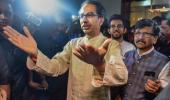The Supreme Court on Thursday asked the Election Commission not to take any precipitate action for now on the Eknath Shinde faction's plea that it be considered the real Shiv Sena and granted the party's poll symbol.

A bench headed by Chief Justice N V Ramana said it would take a call by Monday on referring the matters related to the recent Maharashtra political crisis to a Constitution bench.
The top court also told the poll panel that if the Thackeray faction seeks time to file a response to its notices on Shinde faction's petition, it should consider their request and grant reasonable adjournment.
"Counsels submitted the issues which may arise to decide this case and whether to refer the matter to 5-judge Constitution bench. This will be decided taking into consideration the submissions and the issues framed.
"We will take a call and at the same time, the date fixed by the EC is August 8 to submit a reply by the petitioners (Shinde group). If they (Uddhav) want some more time in view of the pendency of the matter then they will file an application seeking time. It is open for EC to grant reasonable adjournment," the bench, also comprising justices Krishna Murari and Hima Kohli, said.
The apex court was hearing the petitions filed by the Shiv Sena and its rebel MLAs during the recent Maharashtra political crisis which raised constitutional issues including those related to splits, mergers of political parties, defections, and disqualifications.
At the outset, senior advocate Harish Salve, appearing for the Shinde faction, submitted a revised list of legal issues on petitions filed by the rival Uddhav Thackeray group.
Salve said the anti-defection law cannot be an "anti-dissent" law.
"There is no per se illegality principle, until and unless there is a finding of disqualification," Salve said. The bench, at this juncture, said, "If you are completely ignoring the political party after being elected then it is a danger to democracy."
Senior advocate Kapil Sibal, appearing for the Thackeray group, submitted that the 40 rebel MLAs stand disqualified by their conduct and they cannot say that they are the real Shiv Sena.
Senior Advocate Arvind Datar, who is appearing for the Election Commission, submitted the ECI is governed by Representation of the People Act it is bound to decide if a claim is raised by a group.
"Tenth Schedule is a different territory. If they are disqualified, they cease to be members of the legislature. Not a political party. These are different. Whatever happens in the Assembly, that has got nothing to do with the membership of the political party," Datar said.
The Tenth Schedule of the Constitution provides for the prevention of defection of the elected and nominated members from their political party and contains stringent provisions against defections.
The Uddhav Thackeray faction of the Shiv Sena had told the apex court on Wednesday that party MLAs loyal to Maharashtra Chief Minister Eknath Shinde can save themselves from disqualification under the Tenth Schedule of the Constitution only by merging with another political party.
The bench had asked the Shinde faction to redraft the legal issues of split, merger, defection and disqualification raised in petitions filed by the Thackeray camp that are to be adjudicated upon following the recent political crisis in Maharashtra.











 © 2025
© 2025